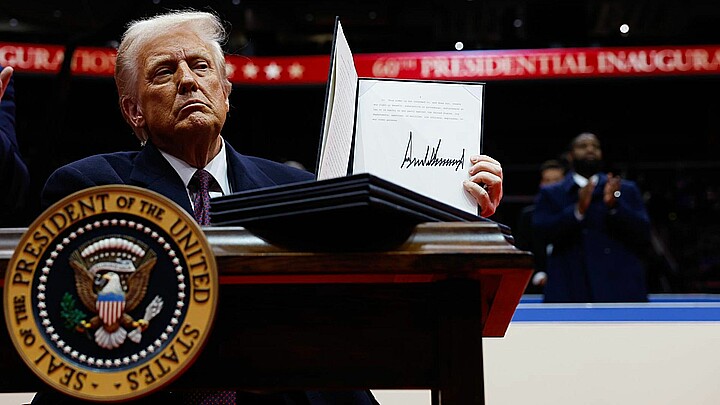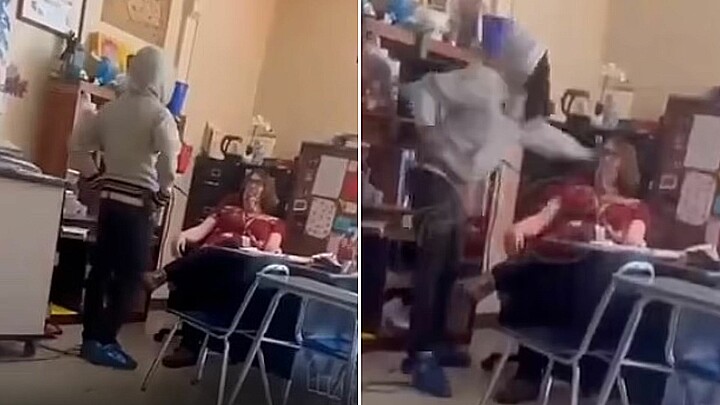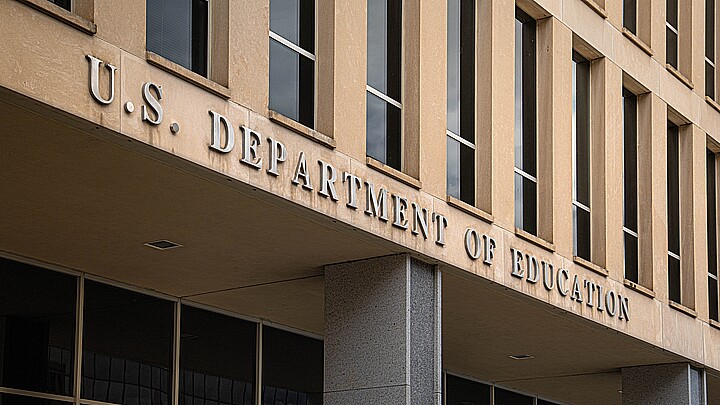Education
Presidential foot in mouth? Biden may have killed his student debt cancellation plan, critics argue
The administration's legal argument for loan forgiveness is based on financial harms caused by the COVID-19 pandemic — a pandemic that, according to Biden, is now "over."
September 19, 2022 11:22pm
Updated: September 20, 2022 8:06am
President Joe Biden may have unintentionally undercut his administration's legal argument justifying his ambitious student loan forgiveness plan, which critics argue is an illegal constitutional overreach.
Biden on Sunday told CBS's "60 Minutes" that the COVID-19 pandemic has effectively ended.
"The pandemic is over," said Biden. "We still have a problem with COVID. We're still doing a lot of work on it. But the pandemic is over. If you notice, no one's wearing masks. Everybody seems to be in pretty good shape."
Less than a month earlier, the Biden administration used COVID-19 to justify the president's announcement that he will unilaterally cancel $10,000 of federal student loan debt for borrowers making less than $125,000 per year and up to $20,000 for those who received Pell Grants, which support tuition for lower-income students.
Biden didn't issue an executive order when he announced his plan. Instead, his administration invoked the Higher Education Relief Opportunities for Students Act of 2003, commonly known as the HEROES ACT, a law passed after the 9/11 terrorist attacks that allows the secretary of education to provide relief from student loan payments during times of war or national emergency.
According to the Biden administration, the COVID-19 pandemic qualified as such a time of emergency.
When Biden made his announcement, the Justice Department released a legal opinion stating the HEROES ACT gives the education secretary the "authority to reduce or eliminate the obligation to repay the principal balance of federal student loan debt, including on a class-wide basis in response to the COVID-19 pandemic."
The Education Department's Office of the General Counsel also issued a memo making an identical argument.
However, Biden's latest declaration about the pandemic undercuts his own legal argument, experts told Just the News.
"The president has declared the pandemic over," said Reed Rubinstein, who previously served as acting general counsel of the Education Department. "Accordingly, the administration's pretextual 'national emergency' has ended. Therefore, the HEROES Act cannot possibly apply. What the administration is doing is now, by its own admission, utterly lawless."
Rubinstein wasn't alone in making this argument.
"The only ground Biden asserted for forgiving student loans — a dubious claim — was the alleged COVID-19 emergency," said John Hinderaker, president of the Center of the American Experiment, who spent over four decades as a litigator. "But that emergency has now ended, according to Biden, while to my knowledge no student loans have yet been forgiven. The administration will argue that student borrowers suffered losses because of the pandemic, and the HEROES Act authorizes making up for those losses even though the emergency is now over. Whether the courts will accept the administration's rationale is doubtful."
Initially, the Trump administration invoked the HEROES Act to temporarily pause student loan payments at the onset of the pandemic in early 2020, maintaining that pause for the remainder of Donald Trump's presidency. (Biden continued the pause but will end it in January 2023 as part of his student debt plan.)
The Trump administration also considered whether the HEROES Act or other statutes could justify mass student debt cancellation. That question resulted in the Education Department issuing in January 2021 a legal memo — penned by Rubinstein — saying the education secretary "does not have the statutory authority to cancel, compromise, discharge, or forgive, on a blanket or mass basis, principal balances of student loans, and/or to materially modify the repayment amounts or terms thereof."
The memo was taken down from the department's website after Biden entered the White House and his administration determined the HEROES Act could not only pause debt but also outright forgive it, even for millions of people.
"The law and the regulations give the secretary a lot of power, and they do not have an explicit cutoff for that power because it has not been tested [in the courts]," Dalie Jimenez, director of the Student Loan Law Initiative at the University of California, Irvine, told Inside Higher Ed. "People who don't want to do this, they don't want to do it for policy reasons. The law is an excuse."
However, other experts in favor of Biden's policy aims are taking issue with his legal justification.
"The problem with the HEROES Act of 2003 is it is clearly about 9/11 context," Jed Shugerman, a professor at Fordham Law School supportive of Biden's policy goals, said in a recent interview. "Even if it says emergencies might be broader than 9/11, the [current Supreme Court] will see COVID as a stretch. I am disappointed. You only have so many shots in the court of public opinion, and I think they lost this round in the court of public opinion by creating questions of whether they are abusing the powers of the executive branch."
Shugerman and other advocates of student loan forgiveness have pointed to language in the Higher Education Act of 1965 that empowers the education secretary to "enforce, pay, compromise, waive, or release any right, title, claim, lien, or demand, however acquired, including any equity or any right of redemption" to argue Congress isn't necessarily needed to cancel student loan debt on a large scale.
However, critics counter that the language refers just to settling loans on a case-by-case basis and doesn't give the executive branch the power to implement large-scale student loan cancellation.
These critics note all executive branch spending must first be appropriated by Congress and contend canceling student debt for millions of Americans via executive action violates the separation of powers fundamental to the Constitution.
Adam Kissel, a visiting fellow at the Heritage Foundation, told Just the News that a close reading of the text of the HEROES Act shows Biden's latest comment on COVID doesn't technically undermine his legal argument. For example, the law says debt cancellation can be justified by financial hardship caused "in connection with" war or national emergency, which is a broad term open for interpretation.
But Biden's COVID declaration is "besides the point," he said, arguing the real problem is the use of the HEROES Act in the first place to justify Biden's student loan plan — a legal rationale he described as "illegal," "political," "arbitrary," and "capricious" in how it determines who does and doesn't receive relief.
Rubinstein agreed.
"The text of the HEROES Act does not support mass cancellation or forgiveness of any sort, much less allow for the arbitrary and fabricated conditions and income caps that Biden has announced," said Rubinstein, now senior counselor and director of oversight and investigations for America First Legal. "The whole program is patently illegal. The House and Senate, together or separately, have standing to bring a challenge because of the separation of powers issue created by the administration's overreach."
House Speaker Nancy Pelosi (D-Calif.), a Biden ally, told reporters last year that Biden didn't have the power to cancel student debt.
"That has to be an act of Congress ... the president can't do it," said Pelosi. "That's not even a discussion."
Biden himself has previously expressed reluctance about using executive authority to enact widespread student loan forgiveness, saying in December 2020: "I think that's pretty questionable. I'm unsure of that. I'd be unlikely to do that."
Critics of Biden's plan are expected to launch legal challenges to stop it from being implemented. One such critic considering litigation is the Job Creators Network.
"The Biden administration does not have the authority to do this," Elaine Parker, president of the Job Creators Network, told the John Solomon Reports podcast on Monday. "It is a clear overreach, and particularly when they're referencing a law that was put in place [following] the September 11 attacks but was being used under the pandemic. If he's declaring that the pandemic is over, then I think he actually just took away his own justification for why he thinks he has the authority."
Parker and other experts, including Democrat economists, have argued Biden's plan will make inflation worse, disproportionately benefit wealthier Americans, and cost taxpayers hundreds of billions of dollars.
"Essentially, the Biden administration has made fools out of everyone who has played by the rules and either not taken loans, or taken them and paid them back," said Rubinstein. "There are many things wrong with the current system of federal taxpayer support of and subsidies for higher education, and Congress needs to take a very hard look at some major reforms. But what the Biden people have done is immoral, illegal, and incredibly damaging to our civil society and the rule of law."
Rubinstein added that if Republicans retake control of Congress in the midterm elections, he hopes "their leadership would act forcefully to protect the Constitution by filing suit to stop this egregious abuse of executive power."
Just the News reached out to the White House, Justice Department, and Education Department. None immediately responded to requests for comment.










